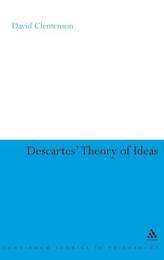
|
Descartes' Theory of Ideas
Hardback
Main Details
| Title |
Descartes' Theory of Ideas
|
| Authors and Contributors |
By (author) David Clemenson
|
| Series | Continuum Studies in Philosophy |
|---|
| Physical Properties |
| Format:Hardback | | Pages:176 | | Dimensions(mm): Height 234,Width 156 |
|
| Category/Genre | Philosophy of the mind |
|---|
| ISBN/Barcode |
9780826487735
|
| Classifications | Dewey:121.4 |
|---|
| Audience | | Professional & Vocational | | Postgraduate, Research & Scholarly | |
|---|
|
Publishing Details |
| Publisher |
Bloomsbury Publishing PLC
|
| Imprint |
Continuum International Publishing Group Ltd.
|
| Publication Date |
3 May 2007 |
| Publication Country |
United Kingdom
|
Description
Descartes held that only ideas are immediately perceived, and that all ideas are really identical to mental states. Yet certain passages in the Meditations seem to assert that some extramental individuals -- the sun, for example, or a piece of wax -- can be immediately perceived (not by the senses, but by the intellect). If so then Descartes was committed to the seemingly absurd claim that extramental things can be really identical to mental states. But the claim is not absurd; as this book shows, it is based on a coherent doctrine of intentional representation that was taught at the Jesuit college of La Fleche that Descartes attended as a youth. On this doctrine, an individual that is outside the mind with one sort of being can be inside it with another. This book brings a fresh perspective to the currently deadlocked debate over whether Descartes was a representationalist or a direct realist, and sheds new light on his difficult notions of material falsity and the self-representational character of thought.
Author Biography
David Clemenson has two PhDs - one in philosophy from Rice University, USA and the other in history of science from Harvard. His publications include articles in Analysis and the Southwest Philosophy Review.
Reviews"David Clemenson's Descartes' Theory of Ideas is a welcome addition to the recent literature placing Descartes in the context of the final days of scholasticism ... a significant contribution to our understanding of the scholastic background and context in which Descartes wrote ... Clemenson has written a book that will be invaluable to anyone working on Descartes, as well as to those working on late scholastic thought and its relation to modern philosophy. His interpretation of Descartes, as we have seen, is incredibly provocative and will generate much discussion among scholars. Clemenson's knowledge and treatment of the relevant texts, both the obvious and the utterly obscure, is carefully presented, and his discussion of the technical late scholastic texts is clear without being pedantic" -Dan Kaufman, Notre Dame Philosophical Reviews, March 6, 2008 -- Dan Kaufman "Clemenson's study is an example of the detailed examination of philosophical ideas that may have or probably influenced a great philosopher, a very important task if we are to go beyond superficial notions about influences and non-contextual analyses of a philosopher's words and arguments." British Journal for the History of Philosophy, 2009 'Clemenson's excellent and thoroughly-researched book aims at unraveling the mysteries of Descartes' Theory of Ideas by going back to its sources. Simply his identification of these sources is a major contribution of this book... Clemenson's most lasting contribution, however, is his probing and insightful analysis of Descartes' theories in relation to these sources, yielding an interpretation of Descartes' Theory of Ideas that solves a number of long-standing problems and casts new light on a theory that is one of the pillars of Cartesian, and modern, philosophy.' Mark Kulstad, Professor of Philosophy, Rice University, USA "David Clemenson's Descartes' Theory of Ideas is a welcome addition to the recent literature placing Descartes in the context of the final days of scholasticism ... a significant contribution to our understanding of the scholastic background and context in which Descartes wrote ... Clemenson has written a book that will be invaluable to anyone working on Descartes, as well as to those working on late scholastic thought and its relation to modern philosophy. His interpretation of Descartes (DPT), as we have seen, is incredibly provocative and will generate much discussion among scholars. Clemenson's knowledge and treatment of the relevant texts, both the obvious and the utterly obscure, is carefully presented, and his discussion of the technical late scholastic texts is clear without being pedantic." -- Dan Kaufman, University of Colorado * Notre Dame Philosophical Reviews *
|